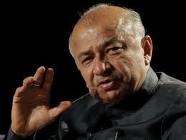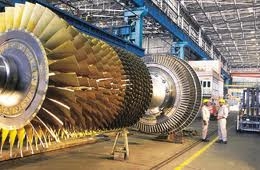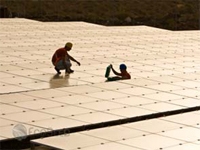News
Nam Theun 2 prepares to resume generation as floodwaters drop
The operators of Nam Theun 2 are preparing to resume power generation for export to Thailand.
Nam Theun 2 prepares to resume generation as floodwaters drop
The operators of Nam Theun 2 are preparing to resume power generation for export to Thailand.
Laos' Nam Ngum II hydropower dam starts selling electricity to Thailand
Nam Ngum II hydropower dam with a generation capacity of 615MW started selling electricity to Thailand but the official sale of electricity will be launched at the end of 2011, said Managing Director of Ratch-Lao Service Company, Mr. Jatuporn Soparaksa, on 24 August. Mr. Soparaksa explains about the Nam Ngum 2 Hydropower operation. Mr. Jatuporn also disclosed that Nam Ngum 2 Hydroelectric Power Plant is currently 90 per cent completed and started its initial operation in 2010. Nam Ngum 2 Hydroelectric Power Plant Project, Nam Ngum III hydroelectric dam, Hongsa electricity thermal plant and Se Pien-Se Nam Noi dam were invested by the RATCH-Lao Services Company. Nam Ngum 2 Hydroelectric Power Plant is located in Vientiane province. The Nam Ngum III hydroelectric dam, located in the north of Nam Ngum II hydroelectric dam with a generation capacity of 440-megawat in Saysomboun district, Vientiane province, has signed an agreement to sell electricity to the Electricity Generation Authority of Thailand. The power house is expected to export electricity in 2016. He said that the largest scale of Hongsa electricity thermal plant in Laos, situated in Sayaboury province, with a generation capacity of 1,878 MW has signed a 25-year agreement for electricity purchasing with the Electricity Generation Authority of Thailand (EGAT). The Hongsa electricity thermal plant will sell 1,473 MW to Thailand and the rest will be distributed for domestic consumption, and the project is scheduled for initial operation in 2015, added Mr. Jatuporn. In addition, the company also have another co-operation project of building a Se Pien-Se Nam Noi dam in Attapeu and Champassak provinces, southern Laos. Upon completion, the dam will have a generation capacity of 390 MW. Most of the electricity output will be exported to Ubon Ratchathani province, north-eastern Thailand, in 2017. The company also plans to provide 10 scholarships every year to Lao students studying on technical machine, electricity and electronic and will organise a short training course for technical schools such as Parkpasack Technical College, Lao-Germen Technical College and other college. This project will be started in academic year of 2011-2012. Source: KPL Lao News Agency
U.S. accuses Korean transformer firms of unfair trade
U.S. producers of liquid dielectric large power transformers has allegedly been hurt by South Korea's allegedly unfair export of large power transformers. This was announced by the US Department of Commerce and the International Trade Commission or ITC.
Bangladesh garment industry to install 1,000MW power plants
The electricity crisis has prompted the Bangladesh Garment Manufacturers and Exporters Association to install their own power plants with a total capacity of 1,000 MW.
Tohoku Electric to get more power from TEPCO
TEPCO announced plans to increase the power supply to Tohoku Electric Power to more than 3,000MW this month.
Tohoku Electric partners with Toyota, State of Miyagi in solar power business
Tohoku Electric Power will establish a new solar power generation business in a joint venture with Toyota Motar Corp and the state of Miyagi.
ADB loans a whopping $100m for energy efficiency project in China
The project will incorporate the first large-scale industrial use of solar thermal technology to generate electricity in the country.
India wants private sector to provide 1/3 power capacity
India's private sector is expected to contribute nearly 36 percent of power sector capacity expansion in the 11th Five Year Plan, which ends 2012. It is also expected to provide over 50 percent in the next plan period. 'The private sector would contribute to nearly 36 percent of the capacity addition in the 11th Plan and over 50 percent of the capacity addition proposed for the 12th Plan. The private sector will bring in nearly 19,000 MW during the current plan,' said Power Minister Sushil Kumar Shinde. Shinde further said the power generation equipment capacity at the state-run Bharat Heavy Electricals Limited will be increased to 20,000 MW in 2012 from 10,000 MW in 2007. 'Several new joint venture companies have been formed to manufacture supercritical boilers and turbine-generators for thermal power plants,' Shinde said. Shinde said the government has approved bulk tendering for 11 units of 660 MW power each. Another bulk tender for nine units of 800 MW each has also been approved. The full story is available at Yahoo News.
S. Korea, Kazakhstan conclude deals on power plant
South Korea clinched key agreements with Kazakhstan Thursday on two US$4 billion projects to build a thermal power plant and a petrochemical complex in the Central Asian nation, the latest fruit of President Lee Myung-bak's trip to Central Asia. After summit talks between Lee and Kazakh President Nursultan Nazarbayev, the two sides signed an "inter-government agreement" guaranteeing South Korea's 70-percent stake in a $4 billion project to build a coal-fired power plant in the southern city of Balkhash. Korea Electric Power Corp (KEPCO) and Samsung C&T currently hold a 35-percent stake each in the project to build a 1,320-megawatt plant that is expected to generate about 7 percent of Kazakhstan's electricity needs. Officials said that the intergovernmental guarantee is a must to make sure that the terms of the contract will remain effective regardless of changes to the law in Kazakhstan and to ensure that the Kazakh government will buy electricity from the plant. In addition, South Korea's LG Chem and Kazakhstan Petrochemical Industries (KPI) also signed a contract to establish a joint venture to push for a $4 billion project to build a petrochemical complex in Atyrau on the northern banks of the Caspian Sea. The envisioned complex will use gas from the nearby Tengiz oil field to produce about 800,000 tons of polyethylene annually. Construction is expected to be completed by 2016, with commercial production to begin the following year, officials said. The two agreements were the largest-ever since South Korea and Kazakhstan forged relations in 1992, and the latest achievement of Lee's three-nation Central Asian tour that already took him to Mongolia and Uzbekistan. In Uzbekistan, a $4 billion deal was signed to develop a massive gas field and build a chemical plant. Lee arrived in Astana on Wednesday. During Thursday's summit talks, Lee and Nazarbayev agreed that the success of the Balkhash power plant and the Atyrau petrochemical complex will serve as a model for further expanding cooperation between the two countries and pledged to cooperate closely on them, officials said. The two leaders also expressed satisfaction that their countries have steadily expanded cooperation and discussed ways to strengthen substantive cooperation in the fields of trade, investment, energy, resources, environment, health care, medicine, IT and agriculture, officials said. The two sides also signed about 20 economic cooperation agreements. Officials said that Lee has developed a close friendship with Nazarbayev as he has held summit talks with the Kazakh leader every year since taking office in 2008. This year's visit would further strengthen their personal bond, officials said. Nazarbayev praised South Korea for playing key roles in the international community, such as last year's hosting of the G20 summit and winning the right to host the 2018 Winter Olympics in the alpine city of PyeongChang. Lee also spoke highly of Kazakhstan's growing international status as shown in its hosting of last year's summit of the Organization for Security and Co-operation in Europe (OSCE) and this year's Winter Asian Games, officials said. Lee also expressed gratitude to Nazarbayev for his decision to participate in next year's Nuclear Security Summit in Seoul, and the Kazakh leader promised to provide support for a successful staging of the summit, officials said. In a display of their friendship, Lee and Nazarbayev called off several events scheduled for later in the day and spent time together at a presidential retreat outside Astana after the Kazakh leader made the suggestion, officials said. The full story is available at Yonhap News.
Kyushu Electric shuts down 600MW unit at Japan power plant
The unit's steam turbine was automatically shut down while generating 400MW of power.
Bangla govt seeks loans for power plants
The government of Bangladesh is looking for loans to fund power projects of a total capacity of 14,773 megawatts by 2015 due to dwindling foreign aid.
BHEL to achieve 20,000 MW manufacturing capacity per annum
Bharat Heavy Electricals Limited is on track to augment its manufacturing capacity to 20,000 MW per annum by March 2012 with its augmentattion programme.
Sunborne Energy secured loan for solar plant
The 12-year INR1.4 billion (US$30.6 million) loan will be utilised in constructing its 15MW plant project in Gujarat, India.
NTPC to build $2.1B Indian thermal plant
National Thermal Power Corp plans to construct a Rs100bn or $2.17 billion thermal power plant in Maharashtra.
Suzlon to build, operate and maintain 48MW wind farm in India
Suzlon Energy has been tapped by Indian Oil to build, operate and maintain a 48.3MW wind facility in Andhra Pradesh.
Mongolia's selling price of coal to China too low: experts
Experts are complaining that Mongolia was selling the coal too cheaply to China during the Tavantolgoi forum held at the Civil Hall at the Presidential Office in Ulaanbaatar. At $US 70 per ton, they say Mongolia’s profit is only USD 10 per ton.
47 TPPs with more than 100 MU in generation losses during July'11
The website caries here, an account of 47 thermal power plants (TPPs) that have exhibited more than 100 million units (MU) worth of shortfall vis-a-vis their targets during April - July, 2011.Various issues, such as low system demand, miscellaneous forced shortages, etc. have contributed to a cumulative shortfall of 11,970.8 million units (MU) in targeted power generation for 47 stations, worth combined capacity of 37,359.25 MW. NTPC Limited was faced with low system demand at its 830 MW Dadri combined cycle power plant (CCPP), and 663 MW Auraiya CCPP; while the 2340 MW Kahalgaon TPS suffered from fuel shortages, reflected in maximum generation losses worth 1068 MU. Further, Talcher STPS, Udupi TPP, Peguthan CCPP and Jalipa Kupurdi TPS recorded shortfalls of 567.94 MU, 465.95 MU, 450.86 MU and 390.03 MU respectively, among others.















 Advertise
Advertise


















